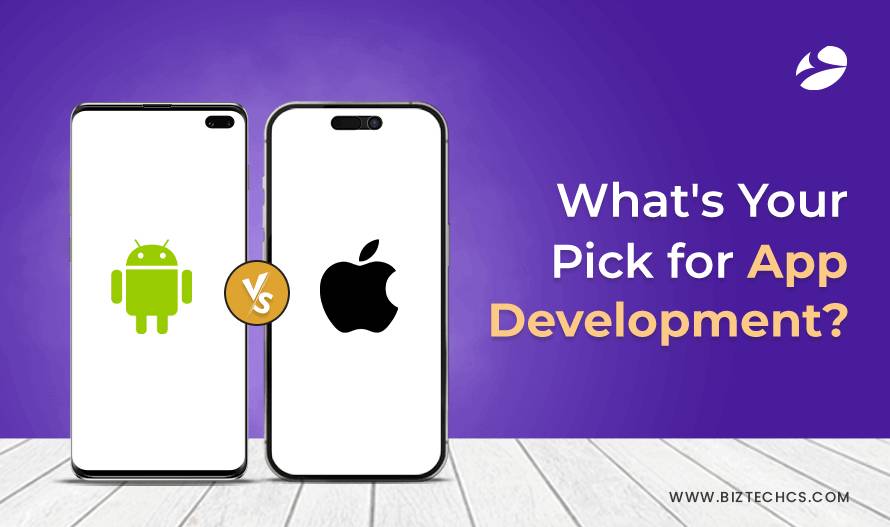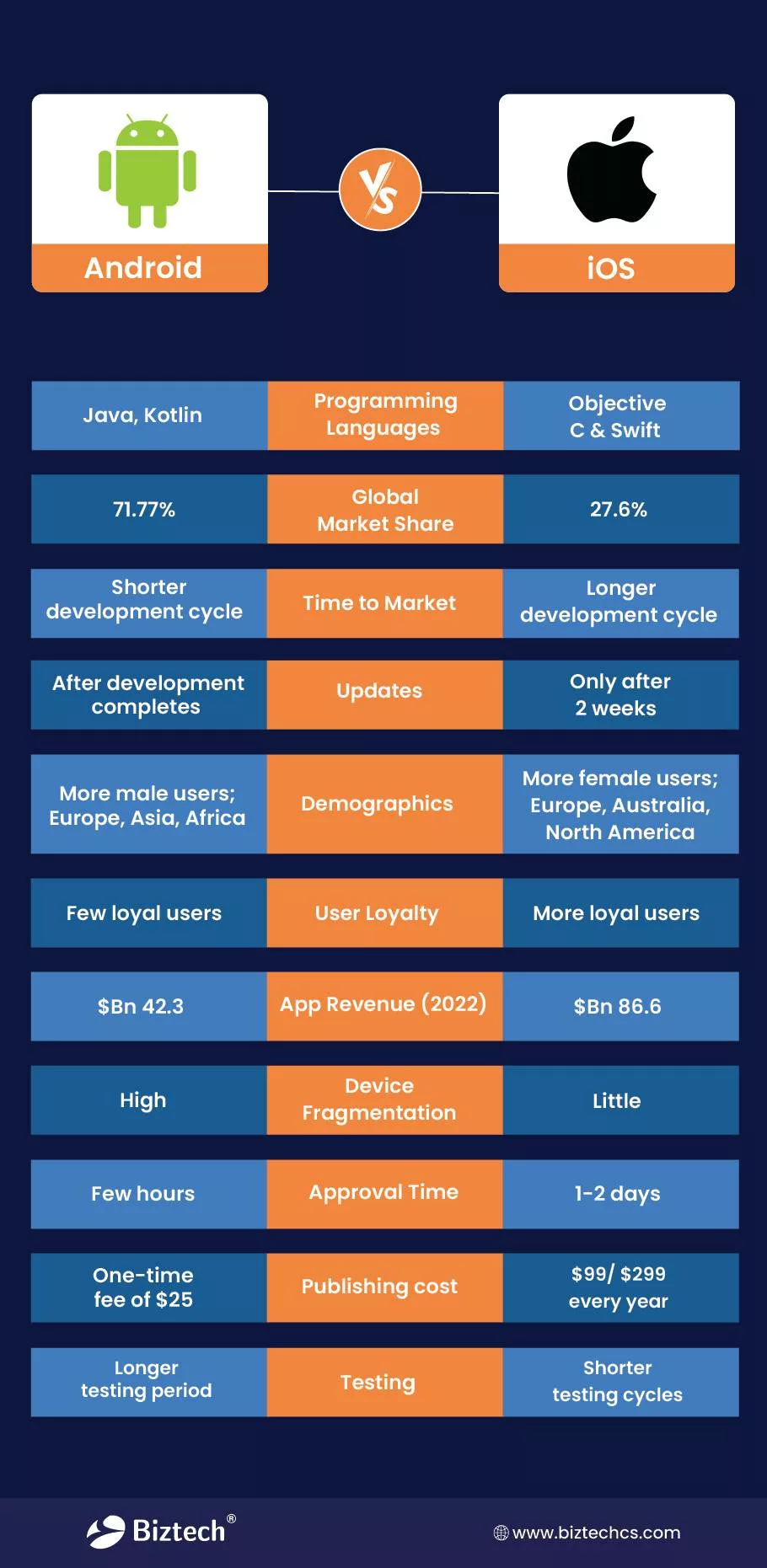5191
Comparing Android vs iOS Development: Which One is Best for Your Mobile App?
18 Jul, 2023
7 min read
5191
18 Jul, 2023
7 min read
Table of content

In 2023, mobile app development continues to play a crucial role in our lives. It offers numerous benefits to both individuals and businesses.
Built by Google, Android powers a wide range of devices, providing a diverse user base and a larger market share.
On the other hand, iOS, developed by Apple, is known for its seamless user experience and high-quality apps.
If you are a developer or considering building the best mobile app for your business, then this blog post is especially for you.
Understanding the Android vs Ios Development differences will help make informed decisions in your app development journey.
So, dive into this guide on the primary differences between Android and iOS before you hire android developers or iOS developers.
The two most popular operating systems for mobile apps are Android and iOS. Android is developed by Google for touchscreen devices like mobile phones and tablets.
It belongs to the Unix-like OS family and uses programming languages such as Kotlin, Java, Javascript, C++, C, Go, and Assembly language.
Android development is the process of developing mobile applications for the robust and flexible Android platform.
Android development offers several benefits that make it a preferred choice for mobile app development. Here are some of the key advantages of Android development:
1. Customizable: Android provides developers with a highly customizable platform. From user interfaces to system functionalities, developers have the freedom to tailor their apps according to specific requirements.
2. Easy Publication Process: Android apps can be easily published on the Google Play Store. The process is relatively simple and straightforward, allowing developers to quickly reach their target audience.
3. Open Platform: Android is an open-source platform, which means developers have access to a vast range of tools, resources, and libraries. This encourages collaboration and innovation within the developer community.
4. Cost-Effective: Developing apps for Android tends to be more cost-effective compared to other platforms. Android’s open-source nature eliminates the need for expensive license fees, making it a budget-friendly choice for startups and small businesses.
5. Developer Availability: With the increasing popularity of Android devices, the demand for skilled Android developers is on the rise. This offers excellent job prospects for developers looking to build a career in the mobile app development industry. Also, you get to choose from a talented pool of developers and hire the best developers.
Despite the many benefits, developing native Android apps can present several challenges as well. Some of the challenges include:
1. Device Fragmentation: Android has a vast range of devices with new models launching every other day; all with different screen sizes, resolutions, hardware capabilities, and versions of the Android OS. This fragmentation makes it challenging for developers to ensure app compatibility across all devices. Thus, the apps need to undergo more thorough testing and optimizing, thereby increasing the development time and effort.
2. App Compatibility: With a wide variety of Android devices, compatibility issues may arise. Developers need to consider different hardware configurations, screen sizes, and resolutions while designing and developing apps. Therefore, it is challenging to ensure consistent functionality and performance across all devices.
3. Google Play Store Review Process: The review process for publishing apps on Google Play Store can be stringent and time-consuming. Google has strict guidelines that you must follow, including content policies, privacy requirements, and quality standards. This process may require multiple iterations and adjustments to the app, which can delay its release.
These challenges may delay the development process to some extent. However, you can combat these problems with careful planning, testing, and optimization. It will ensure your app delivers a seamless user experience across the diverse Android ecosystem.
Apple Inc. has developed iOS mobile operating system dedicatedly for its hardware (Apple mobile devices like iPhone).
Thus, iOS development refers to building mobile apps specifically for devices powered by Apple’s iOS. It is a closed ecosystem. So, developers need to utilize Apple’s development tools and programming languages, primarily Swift, to create apps for iPhones, iPads, and other Apple devices.
The Apple ecosystem is famous for delivering high security and privacy through its apps. Not to mention its family-sharing capabilities, ease of use, and timely OS updates which are the key highlights of iOS development.
Since iOS apps are built specifically for Apple devices, its market share is comparatively low. Even so, it earns 85% more revenue than its Android counterparts, as per reports.
Furthermore, let’s look at the multiple benefits of developing an iPhone app.
Ios development has several benefits over Android that make it a popular choice for businesses and game developers.
1. Excellent UI and intuitive UX: Ios offers a visually appealing and seamless user interface that ensures a great user experience. The design elements of iOS apps are highly polished and consistent, enhancing the overall app aesthetics. It offers a consistent user experience across devices, making it easier for users to navigate and interact with apps.
2. Fluid Responsiveness: Apple devices are known for their smooth and responsive performance. The operating system is optimized to deliver fast and fluid interactions, making it perfect for apps that require speed and precision.
3. Business Suitability: The strong presence of iOS in business is due to its security features, such as encryption and data protection. It offers seamless integration with enterprise systems, making it the perfect platform to develop custom business apps and manage workflows efficiently.
4. Gaming Experience: With powerful hardware and extensive gaming libraries, iOS provides a robust platform for gaming apps. You can leverage advanced gaming technologies like Metal Graphics and Game Center integration to enhance the overall gaming experience through your app.
Developing native iOS apps are good for many reasons as mentioned above. However, as a business, you may find a few challenges with ios mobile app development.
1. Limited Market Share: Although iOS has a significant market share in regions such as North America and Hong Kong, it is still smaller compared to Android globally. Therefore, you have a potentially smaller audience to engage with, make an impact, and convert.
2. Stringent Review Process: The iOS apps are subject to a strict review process by Apple before being published on its App Store. This review process ensures a high standard of quality, but it can be time-consuming and delays the app release timeline.
3. Device Fragmentation: While iOS has a smaller range of devices compared to Android, there is still some fragmentation in terms of different screen sizes, resolutions, and iOS versions. Developers need to ensure their apps are compatible with each device and operating system. It can add complexity to the development process.
4. Limited Customization: The design guidelines of iOS are strict, which explains the limited customization options compared to Android. This means developers have less freedom in terms of UI/UX design, making it challenging to create unique and visually captivating apps.
5. Higher Development Costs: Developing for iOS can be more expensive due to the need for Mac hardware, the cost of Apple Developer Program membership, and limited access to certain development tools. This can be a barrier for people with limited budgets and smaller app development companies.
Now that we know more about iOS and Android app development, let’s compare the two technologies based on multiple factors.

Are you caught up amidst the Android vs iOS app development fiasco? Wondering which is the most-suited platform for developing your app?
Then, here’s the most nuanced Android and iOS app development comparison for you to explore in the current landscape.
1. Budget
Budget considerations are an important aspect of mobile app development. When comparing Android and iOS development, there are some notable differences in terms of cost.Developing an app involves different costs, such as:
2. Publishing
Publishing apps on the Google Play Store and Apple App Store follows slightly different processes, with each platform having its own set of requirements and rules.
Publishing on the Google Play Store is generally considered easier and less stringent compared to the Apple App Store.
Android App Submission Checklist
Google Play’s review team checks for any policy violations or malware. Once approved, the app becomes available for download.
The Apple App Store, however, has stricter regulations and a more rigorous approval process.
Ios App Submission Checklist
In summary, publishing apps on the Google Play Store is generally easier and less time-consuming compared to the Apple App Store.
3. Developer Resources
When it comes to developer resources, both Google and Apple provide comprehensive tools and support for Android and iOS development. Google offers a wide range of resources for Android development. For example,
Apple provides a rich set of developer resources for iOS development. The Apple Developer website provides
While both platforms offer excellent developer resources, Android’s development tools are often considered easier to set up, and they cater to coders of different skill levels.
4. Market Share and Audience Demographics
In the world of mobile development, two dominant platforms, Android and iOS, compete for your as well as your user’s attention.
Did you know Android has a 71.77% market share in the mobile OS market, while the share for iOS apps remains at 27.6%?
In fact, there are over 2.5 Billion active users of Android spread over 190 countries. So, there’s a wide range of Android devices available in the market, giving you the opportunity to reach a larger audience.
This global dominance positions Android as the platform with the widest audience reach and potential.
One of the key factors behind Android’s widespread adoption is the accessibility and affordability of Android devices. Android smartphones and tablets are more popular in emerging markets like Asia, Africa, and Latin America.
In contrast, iOS is more concentrated in developed regions such as Europe, North America, and Japan.
Overall, Android’s market share and popularity in emerging markets set it apart from iOS. However, both platforms continue to attract a substantial user base and provide a fertile ground for app development to showcase their products and meet the diverse needs of their target audience.
5. User-friendliness
When it comes to user-friendly development, both Android and iOS offer unique benefits. iOS development, in particular, stands out for its intuitive interfaces and ease of use. Apple’s operating system is known for its sleek design and straightforward navigation, helping create intuitive apps for users.
One of the key factors contributing to iOS’ user-friendliness is Apple’s Human Interface Guidelines. Since iOS apps are developed to work seamlessly with Apple’s hardware and software, users can enjoy faster load times, smoother animations, and overall better performance.
6. Integration
Integration plays a crucial role in both Android and iOS development, enabling seamless connections and interactions between various devices and platforms.
In Android development, integration is achieved through the Android Open Accessory Development Kit (ADK). It allows developers to integrate with desktops for easy file sharing, synchronization, and the ability to perform tasks across devices.
However, Android’s open ecosystem can sometimes lead to fragmentation issues, as different devices may have varying levels of compatibility and support.
Similarly, iOS development offers integration capabilities through features such as AirDrop, Handoff, and Continuity. These technologies enable smooth transfers and continuity between iOS devices, macOS, and other Apple products.
7. Security
One advantage of native mobile development is the availability of built-in security features. Native apps can leverage the platform’s security measures, such as file encryption and fraud detection. These features help safeguard user data and prevent unauthorized access, enhancing the overall security of the application.
In the Android ecosystem, Google has implemented several security measures to protect users and their devices. For instance,
Furthermore, Google consistently releases security updates to address vulnerabilities and stay ahead of potential threats.
Likewise, the iOS app development also comes with several security features, such as:
By now, you must already be familiar with the difference between iOS and Android development. You can decide which one suits your needs best.
But, what if your target audience belongs to various demographics and uses multiple operating systems, both Android and iOS?
Developing separate native apps for Android and iOS can be expensive. But, With cross-platform development, developers can write a single codebase that functions on both Android and iOS devices.
This eliminates the need for separate development teams and reduces the overall development time and cost. Additionally, it allows apps to reach a wider audience as they can be published on both Google Play Store and Apple App Store.
While cross-platform frameworks aim to provide a uniform user experience, variations in device features and design guidelines can lead to discrepancies. Thorough testing across multiple devices and operating systems is crucial to ensure consistent behavior and user satisfaction.
To address the demand for cross-platform development, several tools have emerged in recent years. Flutter, React Native, Cordova, and Xamarin are among the top platforms chosen by developers for developing cross-platform mobile apps. These tools provide a way to build cross-platform apps with a single codebase, while still maintaining native-like performance and accessing device-specific features.
Have you decided which platform is best suited for your app?
If you have and are looking for the best professionals to guide you through the technical steps, we are just a call away. And if you are still puzzled about which platform would be the best for you, talk to our app development experts and get a consultation.
With 16+ years and 1200+ projects of experience, team Biztech has explored a diverse range of industries and technologies. We can not just help with iOS and Android application development services but will also help suggest the best option for you!
The iOS vs Android development comparison reveals several key findings. Firstly, when it comes to budget, Android development tends to be more cost-effective as it requires less investment in developer resources and offers more flexibility in terms of devices and app stores.
Whereas, iOS development often has a higher price tag due to the need for Apple devices and a more stringent review process.
Programming languages also play a significant role in the decision-making process. While Android primarily uses Java and Kotlin, iOS development relies on Swift. The choice of programming language might not be a greater factor to consider if you hire iOS developers or Android developers remotely for the project.
But, if you already have an in-house development team, it is better to go with their preferred languages.
Market share is another crucial aspect to consider. Android holds a larger market share globally, making it a preferred choice for reaching a wider audience. However, iOS dominates in North America and tends to attract a more affluent user base.
Ultimately, the decision between Android and iOS development relies on these multiple factors as mentioned above. You need to do careful consideration of these differences and pick the best choice for app development.

Odoo
7567
By Biztech
04 Jul, 2025
Odoo
219
By Devik Gondaliya
02 Jul, 2025

Odoo
491
By Devik Gondaliya
25 Jun, 2025